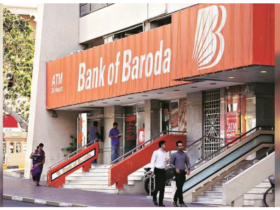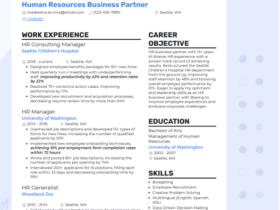5 Must-Have Elements in Your Job Application Curriculum Vitae; When it comes to job applications, your CV is often the first impression you make on a potential employer. A well-crafted CV can set you apart from the competition and land you the job of your dreams.
However, there are some key elements that you should never leave out of your CV if you want to make a good impression. In this article, we will explore the 5 things that should not miss in your CV for job application.

First and foremost, your CV should include clear and concise contact information. This should include your full name, phone number, email address, and physical address. Make sure that your email address is professional and appropriate for a job application. Avoid using nicknames or personal email addresses that may not be taken seriously by potential employers.
Next, your professional experience should be highlighted in your CV. This should include your previous job titles, the companies you worked for, and the dates of your employment. Be sure to include any relevant achievements or accomplishments that demonstrate your skills and experience. This will help potential employers understand how you can add value to their organization.
Key Takeaways
- A well-crafted CV can set you apart from the competition and land you the job of your dreams.
- Your CV should include clear and concise contact information as well as your professional experience.
- Educational background, skills and certifications, and a clean and organized format are all important elements to include in your CV.
Contact Information
When it comes to job applications, one of the most important sections of a CV is the contact information. This section should be clearly labeled and easy to find. It should include the applicant’s full name, phone number, email address, and location.
Phone Number
The phone number should be a direct line to the applicant and should be answered in a professional manner. It is recommended to use a cell phone number, as it is more reliable and accessible than a landline.
Email Address
The email address should be professional and easy to read. It is recommended to use a personal email address, rather than a work email address, as it gives the applicant more control over their communication.
Location
The location of the applicant should include the city and state. It is not necessary to include the full address, as it can be seen as a privacy concern.
Social Media
Social media profiles can be included in the contact information section, but only if they are relevant to the job application. For example, a LinkedIn profile can be included if the job requires networking or social media skills.
Additional Information
If the applicant has additional information that is relevant to the job application, such as a personal website or portfolio, it can be included in the contact information section. However, it should be clear and concise, and not distract from the main purpose of the section.
Overall, the contact information section is an essential part of a CV, as it allows potential employers to contact the applicant and move forward with the application process. It should be clear, concise, and easy to find.
Professional Experience
When it comes to listing professional experience on a CV, the applicant should include only the most relevant positions to the job they are applying for. This section should be listed in reverse chronological order, starting with the most recent position held.
Relevant Positions
The relevant positions should be listed with the job title, name of the employer, and dates of employment. The applicant should also include a few bullet points highlighting their strongest and most relevant accomplishments in each position. This will help the employer understand how the applicant’s experience aligns with the requirements of the job.
Key Achievements
The applicant should also include key achievements within each position, such as successful projects completed or awards received. These achievements can be listed in bullet points or in a table format to make them stand out to the employer.
It is important to keep in mind that the applicant should not include every single job they have ever held on their CV. Instead, they should focus on the positions that are most relevant to the job they are applying for. This will help the employer quickly identify the applicant’s relevant experience and qualifications.
Educational Background
The educational background section is an important part of a CV, especially for entry-level job seekers. It gives employers an idea of the candidate’s academic qualifications and achievements.
When listing educational background on a CV, it is important to include the name and location of the schools attended, as well as the degree or certificate earned and the date of graduation. If the candidate has not yet graduated, it is important to include the expected date of graduation.
It is also important to include any academic honors or awards received, such as dean’s list or scholarships. These accolades can help set the candidate apart from other applicants.
In addition to traditional academic degrees, it is important to list any relevant certifications or training programs completed. For example, if the candidate is applying for a job in the healthcare industry, listing relevant certifications such as CPR or First Aid can be beneficial.
Overall, the educational background section should be clear and concise, highlighting the candidate’s academic achievements and any relevant certifications or training programs.
Skills and Certifications
When it comes to job applications, showcasing your skills and certifications can make all the difference. In this section, we will explore the different types of skills and certifications that should not miss in your CV.
Technical Skills
Technical skills are specific abilities and knowledge required to perform a particular job. They can be acquired through formal education, training, or on-the-job experience. In today’s digital age, technical skills are highly valued by employers. Some examples of technical skills that can make your CV stand out include:
- Proficiency in programming languages such as Java, Python, or C++
- Experience with data analysis tools like Excel or Tableau
- Knowledge of graphic design software such as Adobe Photoshop or InDesign
- Familiarity with project management tools like Asana or Trello
Highlighting your technical skills in your CV can demonstrate your ability to perform specific tasks and contribute to the success of the company.
Professional Certifications
Professional certifications are credentials that demonstrate your expertise in a particular field. They are typically awarded by industry associations, professional organizations, or vendors. Obtaining a professional certification can show your commitment to your profession and your willingness to learn and grow. Some examples of professional certifications that can make your CV stand out include:
- Project Management Professional (PMP)
- Certified Public Accountant (CPA)
- Certified Information Systems Security Professional (CISSP)
- Certified Scrum Master (CSM)
Having a professional certification can make your CV more attractive to potential employers and increase your chances of landing an interview.
Frequently Asked Questions
What are the essential elements to include in my CV for a job application?
When crafting a CV for a job application, it is important to include the following essential elements:
- Personal details (name, contact information)
- Professional summary or objective statement
- Work experience (with bullet points highlighting accomplishments)
- Education and training
- Relevant skills and certifications
Which personal details are considered must-haves on a professional resume?
A professional resume should include the following personal details:
- Full name
- Phone number
- Email address
- Mailing address (optional)
- LinkedIn profile (optional)
What are common errors people make when crafting their CVs?
Some common errors people make when crafting their CVs include:
- Including irrelevant information
- Failing to tailor the CV to the job description
- Neglecting to highlight accomplishments and skills
- Using a generic or outdated template
- Failing to proofread for errors and typos
Which skills are crucial to highlight in a job application CV?
The skills that are crucial to highlight in a job application CV will depend on the specific job and industry. However, some skills that are generally valued by employers include:
- Communication skills
- Problem-solving skills
- Leadership skills
- Time management skills
- Technical skills (e.g. proficiency in software or programming languages)
What categories of information should be omitted from a CV?
When crafting a CV, it is generally best to omit the following categories of information:
- Personal information (e.g. age, marital status, religion)
- Irrelevant work experience
- Hobbies or personal interests (unless they are relevant to the job)
- References (these can be provided later in the hiring process)
How can I tailor my CV to avoid including unnecessary or irrelevant information?
To tailor your CV and avoid including unnecessary or irrelevant information, consider the following tips:
- Read the job description carefully and highlight the key qualifications and skills required
- Use bullet points to highlight accomplishments and skills that are directly relevant to the job
- Omit irrelevant work experience or education that does not relate to the job
- Use keywords and phrases from the job description throughout your CV to show how your experience and skills align with the position.
Also read;














Leave a Reply
View Comments